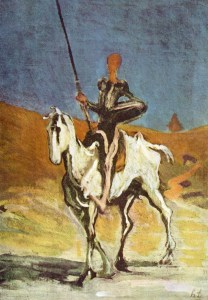Today we explore two links from the worldwide web, both from interesting magazines in the US.
Antonio Muñoz Molina starts his essay Don Quixote or the art of becoming (The Hudson Review) with an interesting premise. When readers start their love affair with books, they like the constancy of characters like Holmes who always cracks the case; Holmes could never be the detective who would fail.
It was Saul Bellow, of American fiction fame, who mentioned that are two kind of folks. Be-ers are those who always stay the way they are, no matter what circumstance they are thrown into. The Becomers are those who are restless enough to want change, and what better place to find the unknown than books?
It may seem commonplace for us, in this time of eBooks and print books, to escape into the solitude of a book. Molina explains the problem with reading that Cervantes identified early on:
“In Don Quixote, the first modern novel, Cervantes addresses this most modern of conundrums. What is the influence of fiction not only over the conscience, but also on the life of readers? With so many books being available for more or less educated readers, how can one pick out the good from the bad? Written words, set in printed letters, exert an almost instant authority: Is there a safe way to find out which stories are true and which are false; in other words, how can solitary readers be certain about the right attitude to be taken toward a particular book? The reader is in constant danger of misreading as long as he or she doesn’t grasp the exact nature of the book. Cervantes was acutely aware of this problem, having been himself as much in love with chivalric and pastoral novels as Don Quixote. Mistaking a novel for a book of history is no less a catastrophe than mistaking windmills for giants or peasant women for princesses.”
Molina rightly points out that while Don Quixote is loved for being a becomer, today he is more outcast than ever before, as the idea of culture which was once acquired by a becomer has been hijacked by the be-er steeped in tradition and custom, unwilling to change, regardless of where he is.

Do you like your female characters to be goody two shoes? Do you cringe at an unfaithful wife or uncaring mother? A story in The Atlantic, Female characters don’t have to be likeable, talks about the repulsion that negative women characters reap; yet they are more popular than people would like to admit:
“More than being “unlikable,” these female characters directly challenge the institutions and practices frequently used to measure a woman’s value: marriage, motherhood, divorce, and career. They defy likability in their outlandish occupation of the roles to which women are customarily relegated—mother, wife, daughter—resisting sexist mythologies and social pressures.”
There are quite a few books that have showcased flawed females in 2015. Think Gone Girl, The Girl on the Train, and several others. Looks like not so socially correct women are here to stay, at least in books and the movies.
